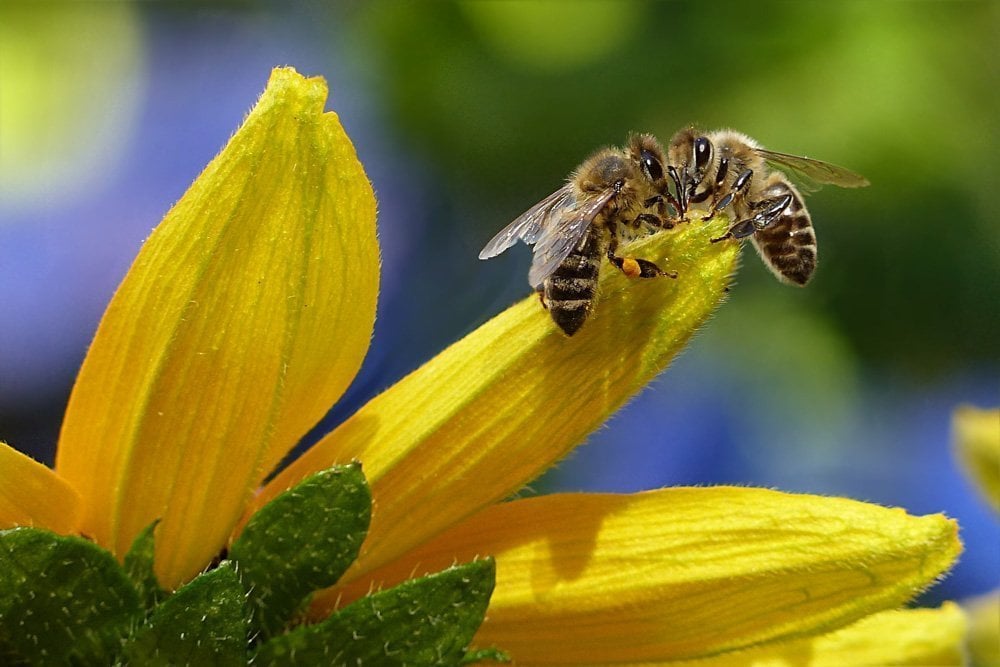
Our tiny furry friends, the bees, have been in significant decline in recent years due to a
number of reasons, including climate change, habitat loss, monoculture (where only a single crop is grown, losing biodiversity), pesticides and herbicides, and disease.
According to the U.S. Department of Agriculture, these vital pollinators feed 80 percent of the crops that we eat, including apples, onions, avocados, asparagus, broccoli, blueberries, tomatoes, and coffee, to name a few. In fact, at least 400 agricultural plant species wouldn’t exist without bees, nor would 1 in 6 of the world’s flowering plants. One honey bee can pollinate thousands of flowers in a day, and an entire colony of bees can pollinate millions in a day. We get to live in a beautiful colourful world because of these incredible creatures.

Bees are important for whole eco-systems to function. The plants that reproduce through bee pollination feed, not only humans, but other animals such as birds and insects. If these food sources diminish, entire food chains would suffer.
The ingenious honey bee is a marvel indeed, known to be capable of abstract thinking and a complex form of communications that include intricate ‘dance’ movements. They can also distinguish their own family members from other bees in the hive.
These buzzing beauties produce all sorts of wonderful things in addition to honey itself. They create beeswax, secreted from the underside of the abdomen and used to construct honeycomb. Bee pollen is another wonder, a mixture of flower pollen, nectar, enzymes, honey, wax and bee secretions, containing over 250 active substances. Propolis is also produced; a dark brown substance made from saliva, beeswax and secretions gathered from tree buds, sap, or other plant sources, used to seal spaces in the hive and known to contain antibacterial, antiviral, antifungal, and anti-inflammatory properties. And then there’s royal jelly, produced by the mouth glands of young bees; a creamy coloured substance fed to queen bee larvae.
Be aware that large-scale factory farming can be cruel to bees in a number of ways. If you are going to eat bee products purchase them from smaller, preferably local hives, and aim for raw organic honey.
6 Ways To Help Bees
Plant bee-friendly flowering plants
Provide bees with natural habitat to feed on by planting flowers in your garden. Aim for a range of species that bloom over different seasons. There are packets of bee-friendly flower seeds available, or here is a list of 25 bee-friendly plants as examples.
If you don’t have a garden, you can plant in window boxes, or pots along your driveway; any outdoor space, particularly amid an urban environment, will provide forage for bees as well as be aesthetically pleasing.

Wildness and weeds
Some of bees most valued food sources are wild flowers and what might be classified as weeds, dandelions and clover just two examples. You can allow part of your garden to grow wild and meadow-like so bees can enjoy the nectar of a wider range of flowering plants (and you can always cut them back after they have bloomed).
Avoid chemicals and pesticides.
Keep your garden pesticide-free. Pesticides and herbicides contain chemicals that are very harmful to bees and other insects. Even small doses of pollen and nectar with traces of these chemicals can build up in a beehive over time and lead to neurological problems and even the collapse of an entire colony.

Give bees water
Bees get thirsty too! It’s easy to help them with safe access to clean water by placing some water in a shallow bowl, or bird bath even, with rocks, stones or marbles placed in it that reach above the water level so they can crawl about, or pieces of cork that will float in the water to provide landing spots so bees can drink safely without drowning.
Offer a bee hotel
If you have a garden consider buying or building a bee house (any space that can home bees) to give bees support with habitat and help populations recover and grow. You can search online for how to create a simple bee home or purchase a ready-made one.

Eat organic (and preferably locally grown) food
Eating organic alone goes a long way to helping bees. Even better, where you can, buy from local farmers, which means eating seasonally as well, and ensuring your food has not come from a monoculture. The more you support earth-healthy sustainable agriculture the more you support bees.
https://www.baldhiker.com/2019/05/20/the-wonder-of-bees-and-6-ways-to-help-them/?utm_source=feedburner&utm_medium=feed&utm_campaign=Feed%3A+baldhiker%2FeBkb+%28Baldhiker%29

No comments:
Post a Comment